Why is haydn considered the father of the symphony – Franz Joseph Haydn, the celebrated Austrian composer, is hailed as the “Father of the Symphony” for his groundbreaking contributions to the genre. Through his innovative use of orchestral form, thematic development, and influence on later composers, Haydn played a pivotal role in shaping the classical music tradition.
Haydn’s symphonies expanded the structure and scope of the genre, introducing a wider range of instrumentation, dynamics, and tempos. His mastery of thematic development and variation techniques created cohesive and engaging musical structures, while his experimentation with different keys and counterpoint enhanced the depth and complexity of his compositions.
1. Haydn’s Innovations in Orchestral Form

Haydn’s groundbreaking contributions to the symphony lie in his innovative use of instrumentation, dynamics, and tempo.
Expansion of Orchestral Forces
- Enlarged the size and scope of the orchestra, incorporating instruments such as clarinets and bassoons.
- Created a balanced and cohesive ensemble that allowed for greater flexibility and expressive range.
Innovative Use of Dynamics
- Introduced extreme contrasts in dynamics, from soft whispers to thunderous crescendos.
- Explored the expressive potential of dynamics to convey emotion and create dramatic effects.
Experimentation with Tempos and Keys
- Expanded the range of tempos within a single symphony, introducing sudden shifts and variations.
- Used modulations to distant keys to create a sense of harmonic tension and release.
2. Thematic Development and Variation

Haydn’s mastery of thematic development and variation techniques played a crucial role in the evolution of the symphony.
Thematic Fragments and Development
- Devised cohesive musical structures by using thematic fragments as the basis for extended development.
- Transformed simple melodic ideas into complex and engaging musical statements.
Counterpoint and Imitation
- Incorporated counterpoint and imitation to enhance thematic development and create a sense of contrapuntal complexity.
- Explored the possibilities of polyphonic writing within the symphonic form.
3. Influence on Later Composers

Haydn’s symphonies profoundly influenced the works of subsequent composers, shaping the development of the genre.
Mozart and Beethoven
- Mozart and Beethoven adopted Haydn’s innovations and further expanded the scope of the symphony.
- Their symphonies showcased the influence of Haydn’s thematic development, orchestral treatment, and harmonic techniques.
Evolution of the Symphony
- Haydn’s symphonies laid the foundation for the evolution of the genre, establishing the standard form and structure.
- Later composers built upon his ideas, creating symphonies of increasing complexity and expressive range.
4. Legacy and Historical Significance: Why Is Haydn Considered The Father Of The Symphony

Haydn’s enduring legacy as the “Father of the Symphony” stems from his pivotal contributions to the development of orchestral music.
Pioneer of the Symphonic Form
- Haydn transformed the symphony from a simple overture into a complex and sophisticated musical form.
- His innovations in structure, orchestration, and thematic development laid the groundwork for the symphonic tradition.
Inspiration for Future Generations, Why is haydn considered the father of the symphony
- Haydn’s symphonies continue to inspire and influence composers today, demonstrating the enduring power of his musical genius.
- His legacy as a master of orchestral music is firmly established, securing his place as one of the greatest composers of all time.
Expert Answers
What are Haydn’s most famous symphonies?
Some of Haydn’s most renowned symphonies include the “Surprise” Symphony (No. 94), the “Military” Symphony (No. 100), and the “London” Symphony (No. 104).
How many symphonies did Haydn compose?
Haydn composed over 100 symphonies, each showcasing his unique style and innovative approach to the genre.
Why is Haydn considered the Father of the Symphony?
Haydn is considered the Father of the Symphony due to his groundbreaking contributions to the genre, including his expansion of the structure and scope of the symphony, his mastery of thematic development and variation techniques, and his influence on later composers.